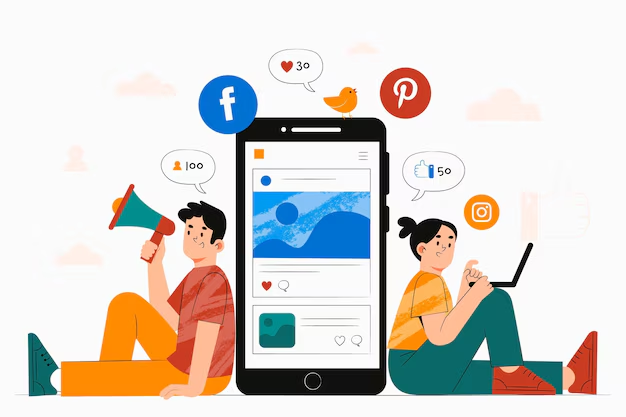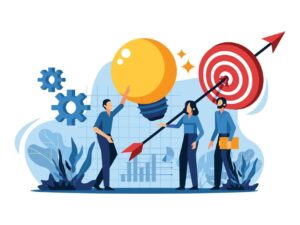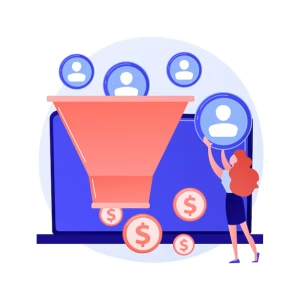Key Points
- Social media platforms enable addiction treatment centers to humanize their services by sharing authentic recovery stories, which can significantly reduce societal stigma and encourage more individuals to seek help without fear of judgment.
- Targeted advertising on platforms like Facebook allows treatment centers to reach high-intent audiences based on demographics, behaviors, and interests, resulting in cost-effective lead generation that directly boosts admissions rates.
- Integrating Customer Relationship Management (CRM) systems with social media campaigns streamlines lead nurturing, ensuring that inquiries from potential patients are handled promptly and personalized, leading to higher conversion rates.
- A well-crafted social media strategy can foster community building among alumni and families, creating supportive networks that extend beyond treatment and contribute to long-term recovery success.
- Despite challenges like algorithm changes and privacy concerns, the advantages of social media marketing far outweigh the disadvantages when centers partner with specialized agencies, achieving measurable ROI through data-driven insights and transparent performance tracking.
Introduction
In today’s digital landscape, addiction treatment centers face unique challenges in reaching those who need help the most. Social media marketing for addiction treatment centers has emerged as a transformative tool that bridges the gap between individuals struggling with substance abuse and the life-changing resources available at treatment facilities. For companies like Clear Path Treatment Solutions, which specializes in digital marketing for drug and alcohol treatment centers, leveraging social media is not just about visibility but about facilitating meaningful access to healthcare. This article explores the intricacies of social media marketing tailored specifically for addiction treatment centers, drawing on proven strategies to drive engagement, leads, and ultimately, recoveries.
Clear Path Treatment Solutions stands out by offering a comprehensive approach that combines targeted ad campaigns on platforms like Facebook with in-house admissions support, ensuring that every social media interaction translates into real-world impact. Their data-driven methods, including integration with Salesforce for CRM, exemplify how social media can be harnessed to optimize growth for rehab facilities. As we delve deeper, we will cover essential aspects that make social media an indispensable part of marketing for these centers.
What Is Social Media Marketing (SMM)?
Social media marketing, often abbreviated as SMM, refers to the strategic use of social platforms to promote products, services, or brands while engaging with audiences in real-time. For addiction treatment centers, this involves creating content that educates, inspires, and connects with individuals affected by substance use disorders. Platforms such as Facebook, Instagram, Twitter, and LinkedIn serve as virtual spaces where centers can share informative posts, videos, and infographics about recovery journeys.
At its core, SMM encompasses both organic efforts, like posting regular updates to build a community, and paid advertising, which targets specific user groups. Clear Path Treatment Solutions excels in this area by designing tailored Facebook ad campaigns that focus on high-intent leads for drug and alcohol treatment centers. This form of marketing goes beyond traditional advertising by fostering two-way communication, allowing centers to respond to comments and messages promptly, which builds trust and credibility.
Understanding SMM also means recognizing its evolution from simple posts to sophisticated algorithms that prioritize user engagement. Addiction treatment centers can utilize features like live sessions to host Q&A about detox processes or share testimonials from alumni, making the content relatable and actionable. In essence, SMM transforms social platforms into powerful allies in the fight against addiction, helping centers like those partnered with Clear Path to reach underserved populations effectively.
Why Is Social Media Marketing (SMM) So Powerful?
The power of social media marketing lies in its ability to connect with billions of users worldwide, offering unparalleled reach and personalization. For addiction treatment centers, this translates into the capacity to destigmatize mental health and substance abuse issues through widespread awareness campaigns. Unlike traditional media, SMM allows for immediate feedback and interaction, which can amplify messages of hope and recovery.
One key reason SMM is so powerful is its data-rich environment, where analytics reveal user behaviors and preferences in detail. Clear Path Treatment Solutions leverages this by using mobile call tracking and analytics to monitor campaign performance, ensuring that ads resonate with those searching for treatment options. This targeted approach not only increases visibility but also drives conversions by reaching individuals at critical moments in their journey toward sobriety.
Furthermore, the viral potential of social media content makes it exceptionally influential. A single heartfelt story shared by a recovering individual can inspire thousands, creating a ripple effect that encourages others to seek help. In the context of addiction treatment, this power is amplified because social platforms facilitate community support, where users can form groups to share experiences and resources. Agencies like Clear Path enhance this by integrating SMM with admissions processes, turning online engagements into verified leads and facilitated healthcare access.
The emotional resonance of SMM cannot be overstated, as it humanizes treatment centers and portrays them as compassionate partners in recovery. This emotional connection often leads to higher engagement rates, making SMM a cornerstone for sustainable growth in the competitive landscape of healthcare marketing.
How Social Media Marketing (SMM) Works
Social media marketing operates through a combination of content creation, audience targeting, and performance analysis to achieve desired outcomes. It begins with identifying the right platforms where potential clients are most active; for addiction treatment centers, Facebook and Instagram often yield the best results due to their visual and interactive nature. Content is then crafted to align with user interests, such as educational posts on the signs of addiction or motivational videos featuring success stories.
The mechanics involve algorithms that prioritize content based on engagement metrics like likes, shares, and comments. Clear Path Treatment Solutions optimizes this by running paid campaigns that use advanced targeting options, such as demographics related to age, location, and interests in health and wellness. Once a user interacts with an ad, the system funnels them toward a call-to-action, like contacting the center for a consultation.
Integration with tools enhances how SMM works, allowing for seamless tracking of user journeys from initial view to admission. For instance, retargeting ads remind users who have visited a center’s page but not converted, increasing the chances of follow-through. In practice, this means addiction treatment centers can measure ROI through metrics like cost per lead and conversion rates, adjusting strategies in real-time for maximum effectiveness.
Ultimately, SMM works by building a narrative around recovery that resonates personally, encouraging users to take the first step toward treatment while providing centers with actionable insights to refine their outreach.
Customer Relationship Management (CRM) in Social Media Marketing
Customer Relationship Management (CRM) plays a pivotal role in enhancing the effectiveness of social media marketing for addiction treatment centers. CRM systems like Salesforce, which Clear Path Treatment Solutions integrates into their services, allow for the centralized management of leads generated from social platforms. This ensures that every interaction, from a comment on a post to a direct message inquiry, is tracked and nurtured appropriately.
By linking CRM with SMM, centers can personalize follow-ups based on user data, such as previous engagements or expressed concerns about treatment options. For example, if a user inquires about alcohol detox via Facebook Messenger, the CRM can flag this for immediate response from admissions experts, streamlining the path to healthcare access. Clear Path’s in-house call center exemplifies this by pre-assessing and verifying insurance, turning social leads into admitted patients efficiently.
The synergy between CRM and SMM also facilitates long-term relationships, where alumni can be engaged through targeted content to prevent relapse and promote ongoing support. This holistic approach not only boosts retention but also generates positive word-of-mouth, amplifying the center’s reach organically. In the sensitive field of addiction treatment, effective CRM ensures confidentiality and empathy, fostering trust that is crucial for successful outcomes.
Advantages and Disadvantages of Social Media Marketing (SMM)
Social media marketing offers numerous advantages for addiction treatment centers, including cost-effectiveness compared to traditional advertising methods. Platforms allow for precise targeting, reducing wasted spend and maximizing impact on relevant audiences. Another advantage is the ability to build brand loyalty through consistent, value-driven content that positions centers as experts in recovery.
However, disadvantages exist, such as the potential for negative feedback to spread quickly, which requires vigilant monitoring and crisis management. Algorithm changes can also disrupt visibility, demanding constant adaptation of strategies. Privacy regulations add complexity, as centers must navigate data usage carefully to avoid violations while targeting ads.
Despite these challenges, the advantages often prevail when managed professionally. Clear Path Treatment Solutions mitigates disadvantages by providing transparent performance tracking and data-driven adjustments, ensuring that SMM remains a net positive for their clients in the drug and alcohol treatment sector.
Benefits of Social Media Marketing
The benefits of social media marketing extend far beyond mere exposure for addiction treatment centers. It enhances community engagement, allowing centers to create support networks that empower individuals in recovery. Increased visibility leads to higher website traffic and inquiries, directly contributing to admissions growth.
Another benefit is the ability to educate the public on addiction myths, reducing stigma and encouraging early intervention. Clear Path Treatment Solutions amplifies these benefits through their tailored campaigns, which integrate with call center support for seamless lead conversion. Measurable analytics provide insights into what resonates, enabling continuous improvement and better resource allocation.
Ultimately, the benefits culminate in improved patient outcomes, as effective SMM connects more people with timely, life-saving treatment options.
The Essentials of a Successful Social Media Marketing Strategy
Crafting a successful social media marketing strategy requires several essentials, starting with clear objectives like increasing leads or raising awareness. For addiction treatment centers, this means defining target audiences, such as families seeking help for loved ones or individuals researching rehab options.
Content planning is crucial, involving a mix of educational, inspirational, and promotional posts scheduled consistently. Visual elements, like infographics on treatment benefits, enhance engagement. Monitoring tools track performance, allowing for data-informed tweaks.
Partnerships with experts like Clear Path Treatment Solutions provide the essentials through their dual-service model, combining ad expertise with admissions handling. Incorporating CRM integration ensures leads are not lost, while compliance with healthcare regulations maintains ethical standards.
A successful strategy also emphasizes authenticity, sharing real stories to build emotional connections and drive sustainable growth.
Conclusion
Social media marketing represents a vital lifeline for addiction treatment centers, enabling them to reach, engage, and support those in need effectively. By incorporating strategies from Clear Path Treatment Solutions, centers can achieve remarkable results in lead generation and healthcare facilitation. As the digital world evolves, embracing SMM with a focus on empathy and data will continue to transform the landscape of addiction recovery.
FAQs
Q: How can addiction treatment centers measure the success of their social media marketing efforts? A: Addiction treatment centers can measure success through key metrics such as engagement rates, lead conversion percentages, and cost per acquisition, utilizing analytics tools integrated with platforms like Facebook to track performance in real-time.
Q: What role does content creation play in social media marketing for rehab facilities? A: Content creation is essential in social media marketing for rehab facilities because it builds trust by providing valuable information on recovery topics, encourages shares among communities, and attracts potential patients through relatable narratives.
Q: Are there specific platforms best suited for marketing addiction treatment services? A: Facebook and Instagram are particularly well-suited for marketing addiction treatment services due to their advanced targeting features, visual content capabilities, and large user bases interested in health and wellness topics.
Q: How does integrating CRM improve social media marketing outcomes for treatment centers? A: Integrating CRM improves outcomes by centralizing lead data from social interactions, enabling personalized follow-ups, and ensuring efficient management of inquiries, which ultimately boosts admission rates and patient satisfaction.
Q: What common pitfalls should addiction treatment centers avoid in social media marketing? A: Addiction treatment centers should avoid pitfalls like inconsistent posting schedules, ignoring user comments, or violating privacy regulations, as these can damage reputation and reduce the effectiveness of their marketing campaigns.
Sources
Clear Path Treatment Solutions – https://clearpathtx.com
Substance Abuse and Mental Health Services Administration – https://www.samhsa.gov
Meta Help Center – https://www.meta.com/help/
Health Insurance Portability and Accountability Act Resources – https://www.hhs.gov/hipaa
National Association of Addiction Treatment Providers – https://www.naatp.org
Google Ads Help Center – https://support.google.com/google-ads
LegitScript – https://www.legitscript.com





